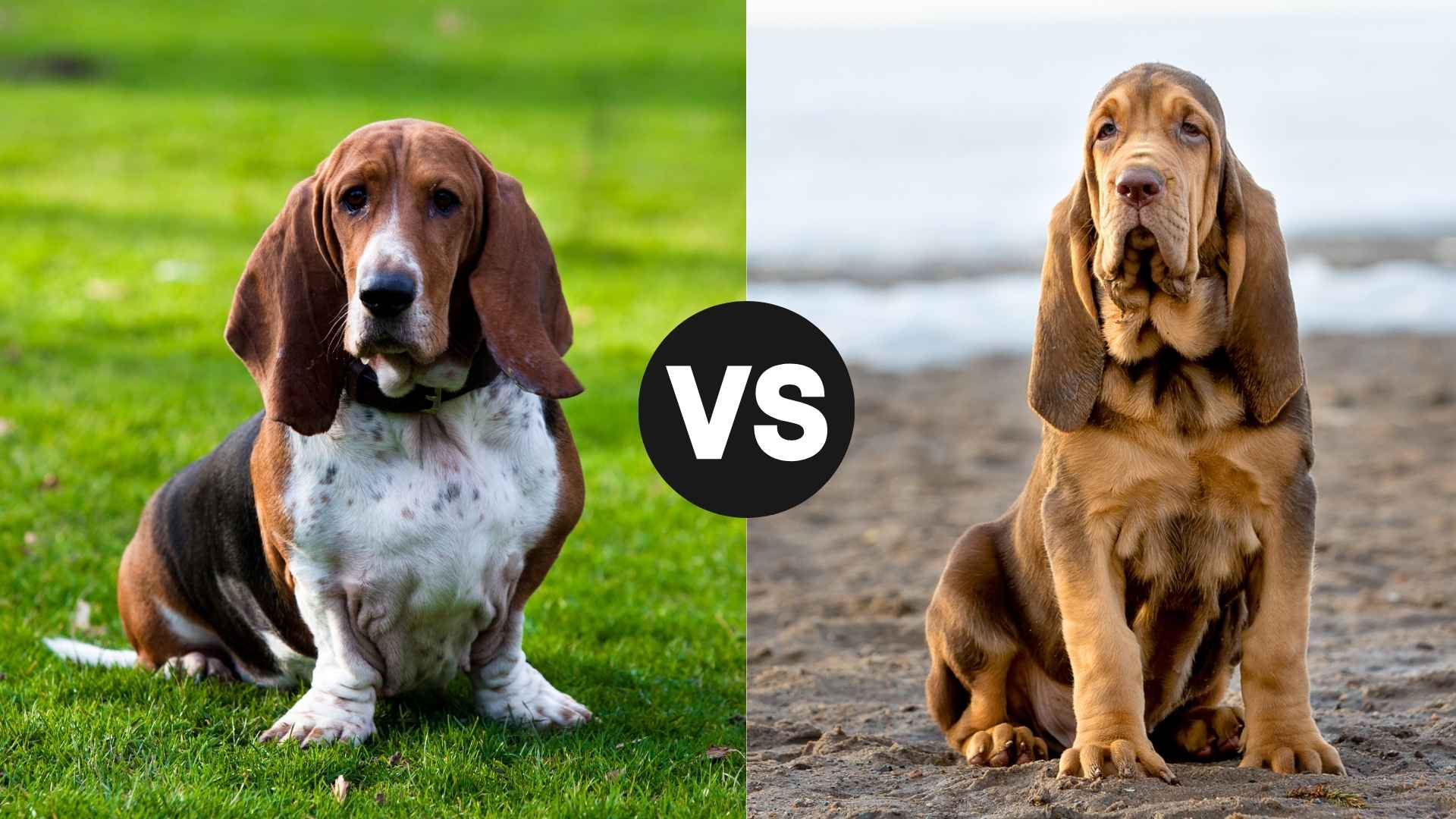Droopy ears, soulful eyes, and noses that could solve mysteries—what’s not to love about hounds? But when choosing your new best friend, how do you pick between the charmingly laid-back Basset Hound and the regal, ever-curious Bloodhound? While both breeds boast legendary noses capable of tracking scents miles away, each offers a unique personality and lifestyle match that could make or break your companionship.
Do you prefer a calm, cuddly pup or an energetic adventurer eager to track scents outdoors? Both of these hound dog breeds differ greatly in personality, grooming, and energy levels. Knowing these key differences will help you pick the perfect dog to match your lifestyle.
In this guide, we’ll dive deep into the captivating world of Basset Hounds and Bloodhounds, exploring everything from temperament to training, ensuring you discover the perfect match for your heart and home.
Fun Fact: Bloodhounds’ sense of smell is so precise that their tracking evidence can be legally admissible in court!
Basset Hound vs. Bloodhound
Basset Hound vs. Bloodhound: An Overview
Basset Hound
With droopy ears, soulful eyes, and charmingly wrinkled faces, Basset Hounds effortlessly win hearts wherever they go. According to the AKC, these compact yet sturdy dogs are known for their gentle, patient personalities, making them wonderful companions, especially in families with children.
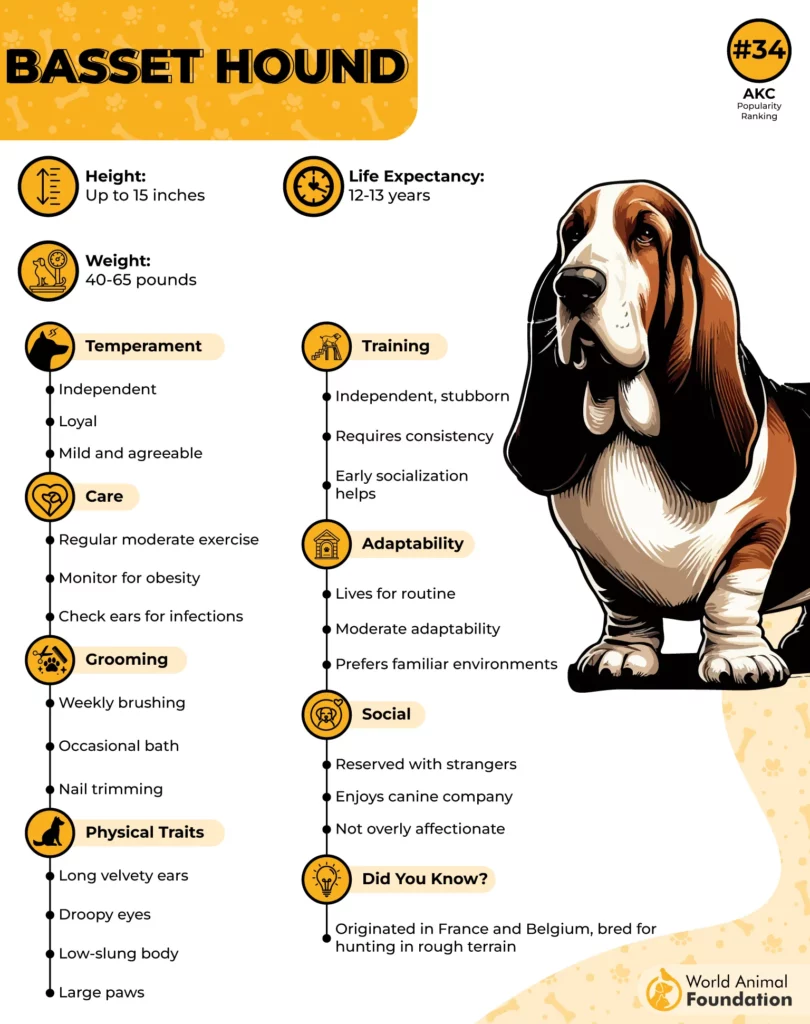
Despite their short stature, Basset Hounds are surprisingly strong and enduring—qualities stemming from their history as hunting dogs bred to follow scents over long distances.
Though they may appear easygoing, Basset Hounds possess a quiet intelligence paired with a famously stubborn streak. Consistent, positive training methods are essential to bringing out their best.
Their moderate energy level makes them adaptable to apartment life, provided they enjoy regular walks and moderate exercise to keep them happy and healthy. Additionally, owners should monitor their diet closely, as Basset Hounds can be prone to weight gain due to their laid-back lifestyle.
Bloodhound
Bloodhounds are large, athletic dogs famous for their unmatched scent-tracking abilities—so precise they’ve successfully tracked scents over distances exceeding 100 miles. Historically prized by royalty for hunting and tracking, these dogs have impressive stamina and determination.
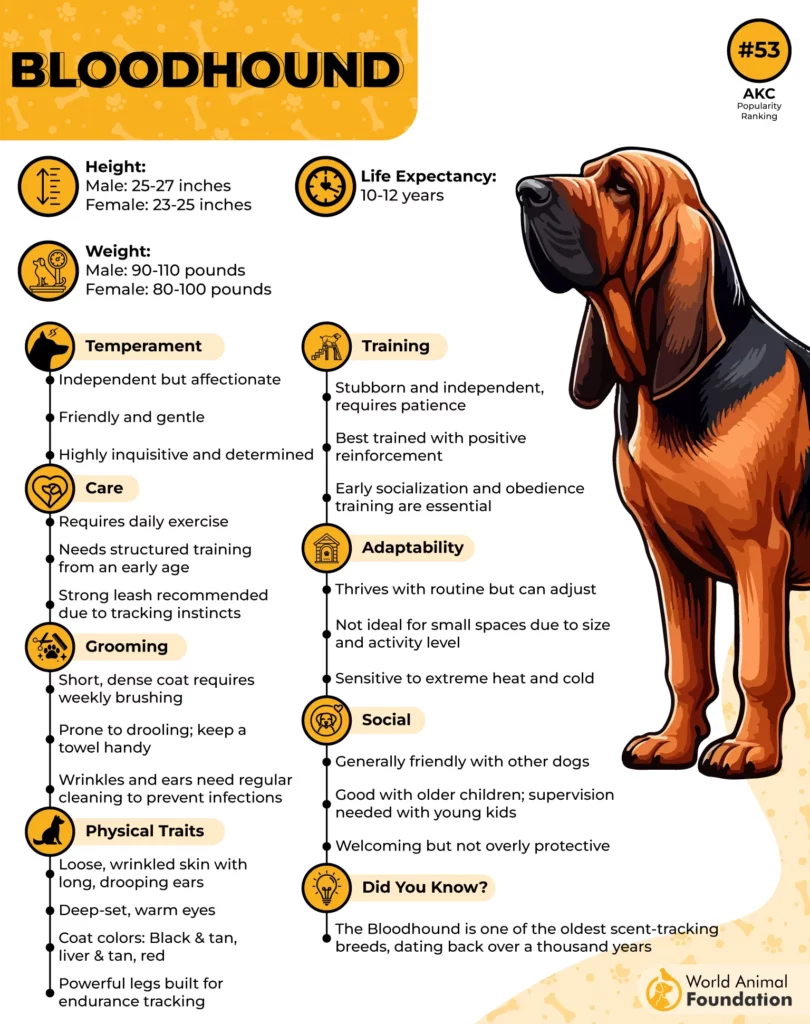
Their powerful noses contain approximately 300 million scent receptors, far surpassing most other dog breeds. Bloodhounds are highly intelligent but often independent-minded, requiring consistent training and clear leadership.
Because of their size and energy, they thrive in spacious environments with plenty of opportunities for exercise and exploration. Without adequate mental stimulation, they may become bored and mischievous, making them ideal companions for owners who enjoy an active lifestyle.
Basset Hound vs. Bloodhound: Size and Weight Comparison
When picking between these lovable hound breeds, size can make all the difference. Here’s a clear comparison to help you visualize how these two breeds measure up:
Feature |
Basset Hound |
Bloodhound |
|---|---|---|
|
Height |
12–15 inches |
23–27 inches |
|
Weight |
40–65 pounds |
80–110 pounds |
|
Build |
Short, stocky, and low-slung |
Tall, athletic, and lean |
The Basset Hound stands just 12 to 15 inches at the shoulder, making them the perfect companion for smaller living spaces or cozy apartments. Weighing between 40 to 65 pounds, their distinctive short legs and long bodies give them their signature charm—and practical tracking skills.
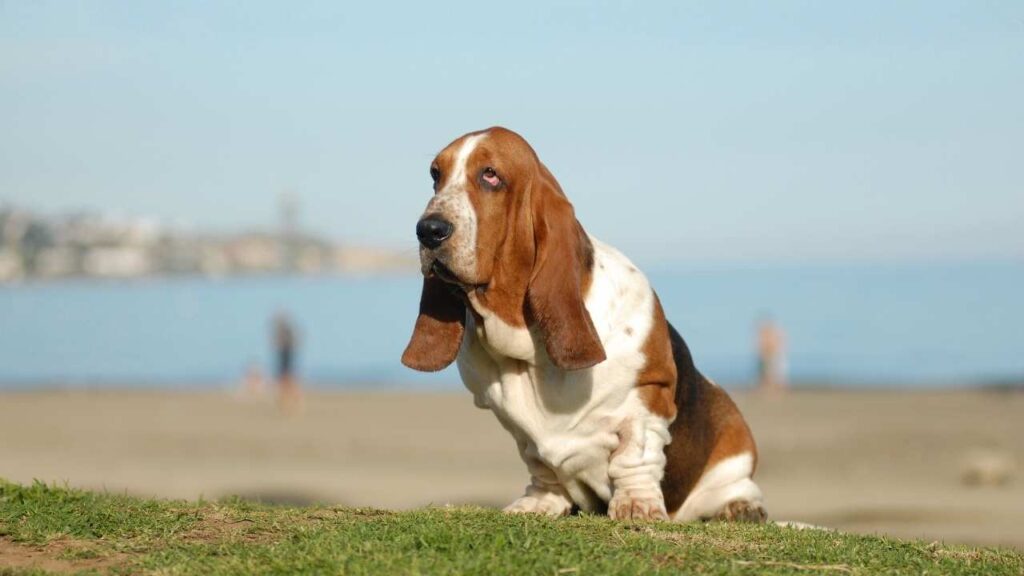
Their low-to-the-ground build lets them easily sniff out scents but also makes them comfortable, low-maintenance housemates who thrive indoors as well as out.
As per PetMD, the Bloodhound is noticeably bigger, reaching heights of 23 to 27 inches and tipping the scales at 80 to 110 pounds. This powerful breed has an athletic, lean build made for endurance, allowing them to tirelessly follow scents across great distances.
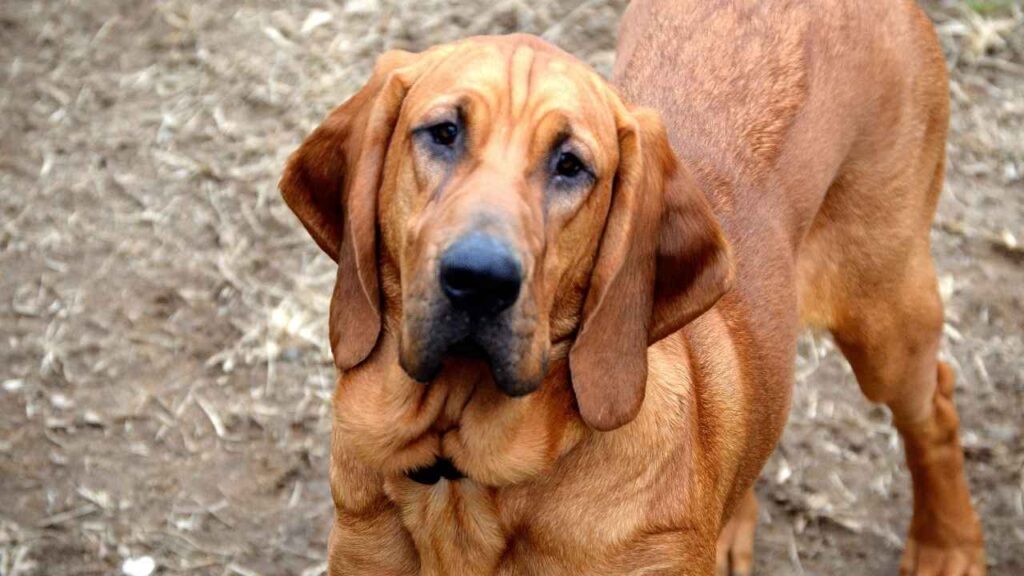
Their size and energy level make them best suited to homes with ample space, large yards, or owners who enjoy an active lifestyle filled with adventures.
Key takeaway
If you’re seeking a smaller, easy-to-manage dog that comfortably fits apartment life or limited spaces, the Basset Hound is your ideal companion. But if you prefer a larger, energetic breed that loves wide-open spaces and adventure, the impressive Bloodhound is a better fit.
Basset Hound vs. Bloodhound: Personality and Temperament Comparison
The temperaments of these two breeds differ greatly, especially when it comes to their interaction with family members and their drive to work.
Basset Hound
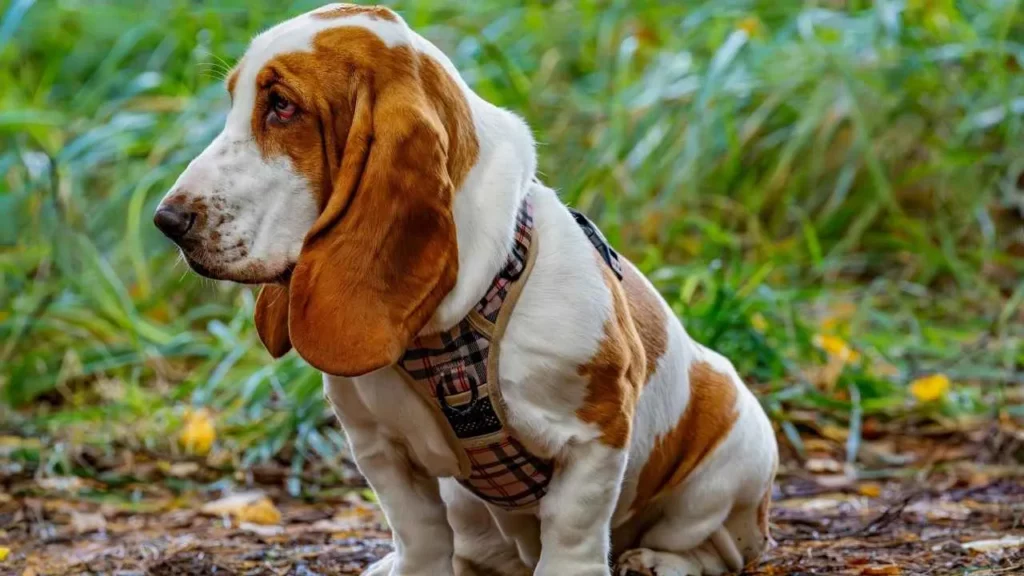
Personality: Basset Hounds are typically calm, affectionate, and friendly. They get along well with children and other pets, making them excellent family dogs.
Energy Levels: While they enjoy moderate walks and playtime, Basset Hounds are known for their relaxed, laid-back demeanor. They are more suited for relaxed owners who appreciate a dog that’s not too demanding.
Independence: Basset Hounds are independent but not overly so. They can be stubborn, which may present challenges in training, but they are generally eager to please.
Bloodhound
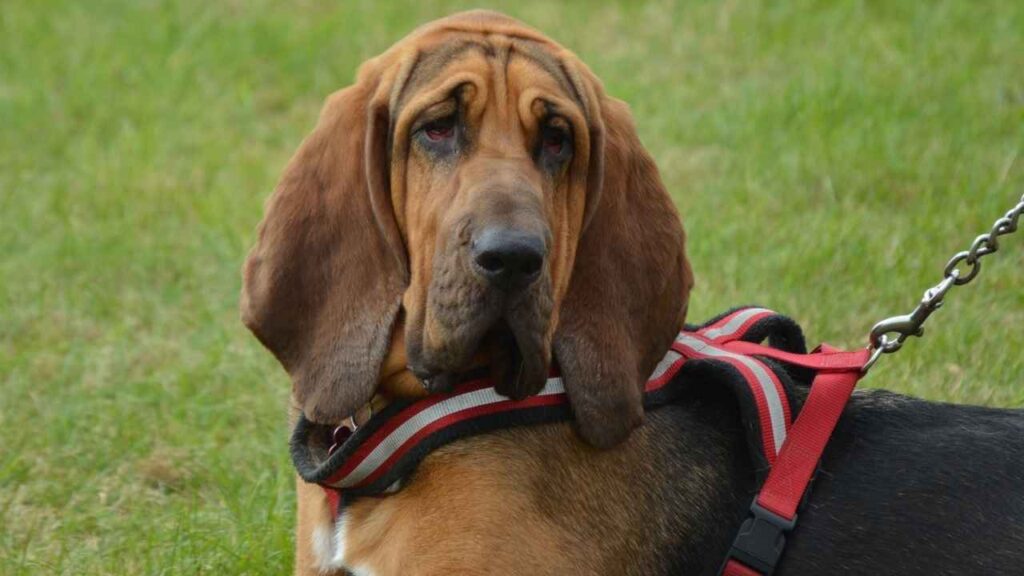
Personality: Bloodhounds are more serious, determined, and independent. While they can be affectionate, their primary focus is often on scent tracking, which can make them seem distant or aloof.
Energy Levels: Known for their boundless energy, Bloodhounds require plenty of exercise. Without enough activity, they can become bored and potentially destructive.
Independence: Bloodhounds are highly independent, often following their noses without regard for commands. This trait makes training more challenging but is also what makes them exceptional trackers.
Key Takeaway: If you’re looking for a low-key, affectionate family companion, the Basset Hound is a great fit. However, if you have an active lifestyle and want a dog with high energy and determination, the Bloodhound may be the better choice.
Basset Hound vs. Bloodhound: Adaptability and Independence Comparison
Both breeds have distinct needs when it comes to their adaptability to living situations and independence.
Basset Hound
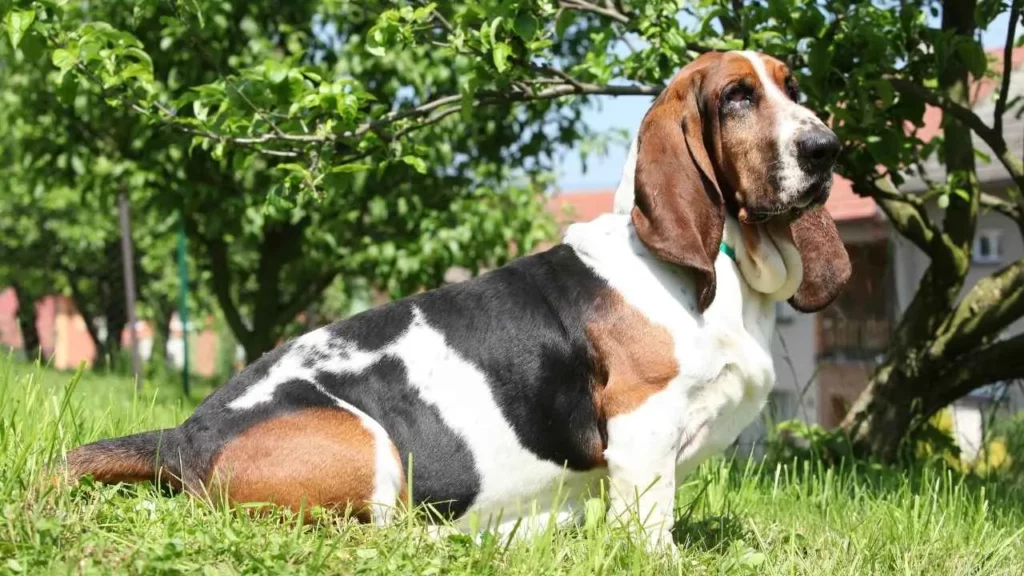
Adaptability: Basset Hounds are well-suited for apartment living and smaller homes, provided they get enough exercise. Their relaxed demeanor means they don’t require constant attention, making them a good fit for people with busy schedules.
Independence: While independent, Basset Hounds are not as solitary as the Bloodhound. They enjoy companionship and are more likely to stay close to their owners.
Bloodhound
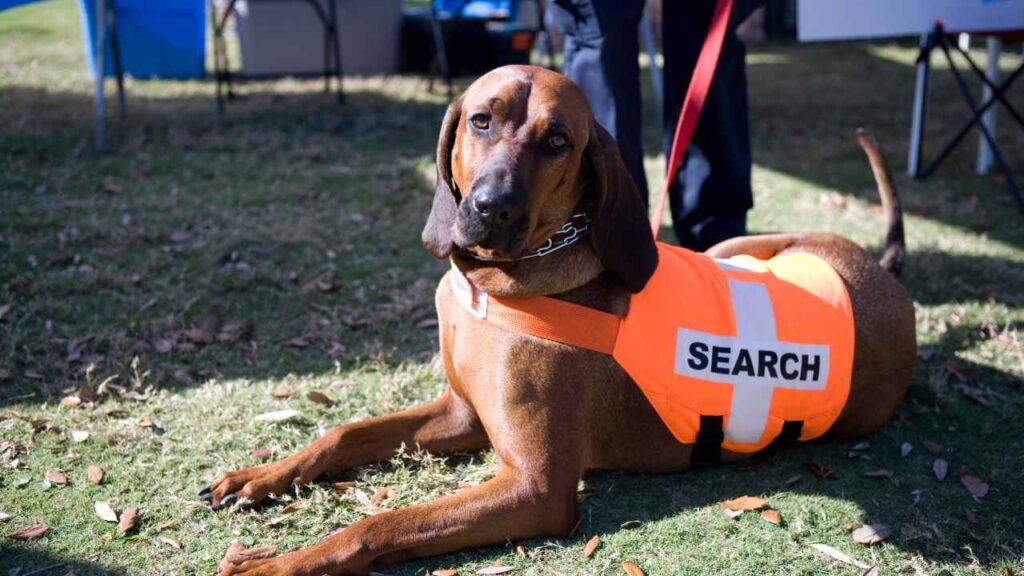
Adaptability: Bloodhounds are best suited for homes with large yards or plenty of space where they can run and follow their noses. They are not as adaptable to apartment living due to their large size and exercise requirements.
Independence: Bloodhounds are incredibly independent, often following scents even if it means wandering away from their owners. They require a handler who can maintain control and discipline.
Key Takeaway: Basset Hounds are more adaptable to smaller living spaces and less demanding environments, while Bloodhounds thrive in homes with more space and need owners who can provide them with mental stimulation and exercise.
Basset Hound vs. Bloodhound: Health and Lifespan Comparison
Both breeds are generally healthy but come with their own set of potential health issues that owners should be aware of.
|
Feature |
Basset Hound |
Bloodhound |
|---|---|---|
|
Lifespan |
10–12 years |
10–12 years |
|
Common Health Issues |
Hip dysplasia, ear infections, obesity |
Hip dysplasia, ear infections, obesity |
Basset Hound
Basset Hounds typically live 10 to 12 years. Their unique build, featuring short legs and long bodies, makes them especially prone to health issues like hip dysplasia and obesity.
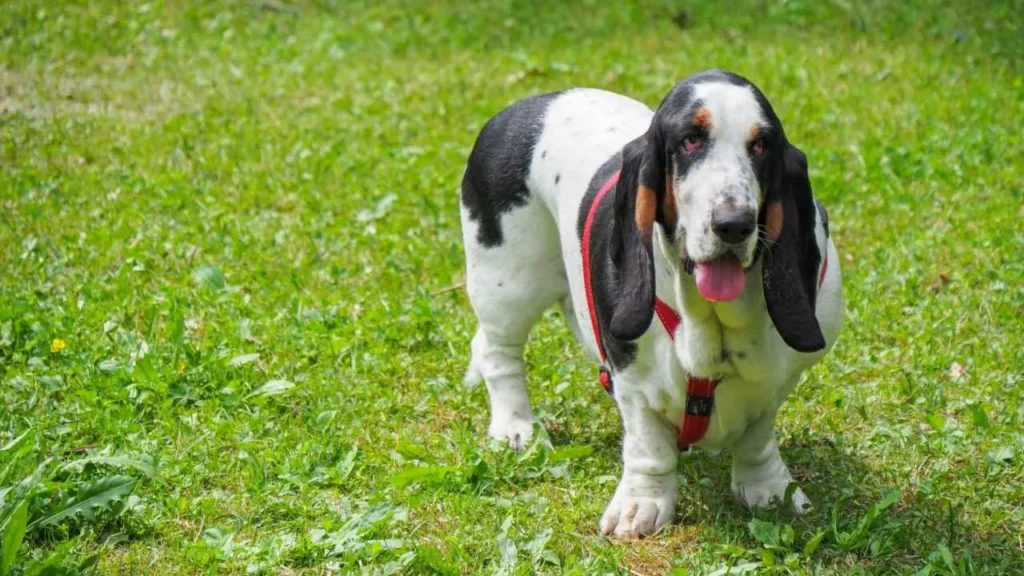
Their characteristic droopy ears often trap moisture, increasing the risk of ear infections. Regular vet visits, proper diet, and consistent ear care are essential to maintaining their health.
Bloodhound
Bloodhounds share a similar lifespan of 10 to 12 years and are also at risk for common health problems such as hip dysplasia and frequent ear infections, due to their floppy ears. Their athletic build and endurance can place extra strain on joints, potentially causing joint-related issues.
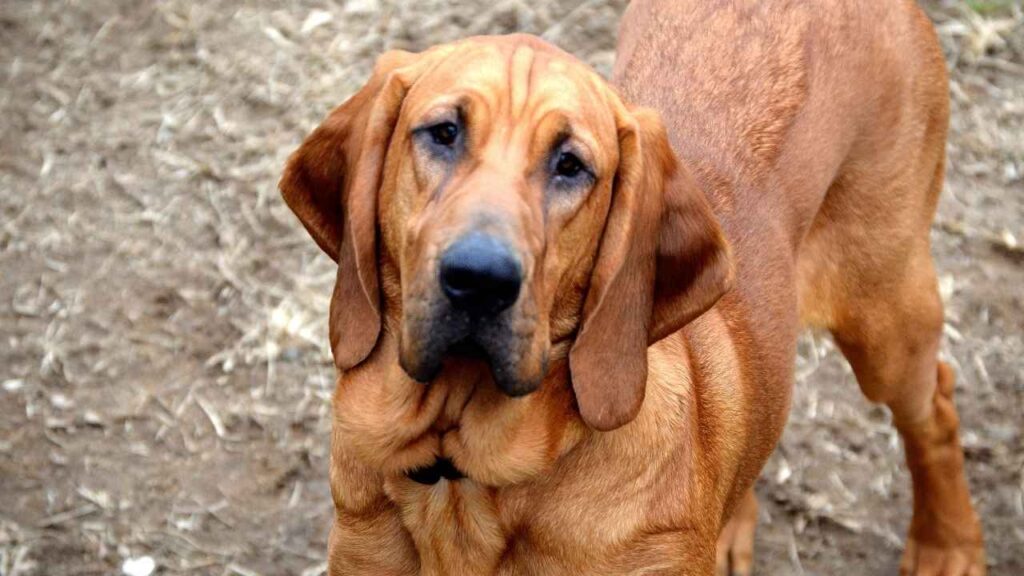
Additionally, the breed’s distinctive loose skin folds require regular cleaning to prevent skin infections and irritation. Careful grooming and routine veterinary checkups are vital for their long-term well-being.
Key Takeaway: Both breeds share similar health concerns, primarily related to their unique body structures. Regular veterinary check-ups, a balanced diet, and proper exercise are crucial for maintaining their health.
Basset Hound vs. Bloodhound: Allergies and Grooming Comparison
Although both breeds have short coats that are generally easy to maintain, each requires specific grooming attention, particularly due to their distinctive skin folds and long ears.
Basset Hound
Basset Hounds have short, smooth coats that need minimal brushing, making daily grooming a breeze. However, their adorable droopy ears and wrinkled skin require extra care—regular ear cleaning and ensuring their skin folds stay dry are crucial to avoid infections. Additionally, Bassets shed moderately and are not hypoallergenic, which may pose a concern for allergy sufferers.
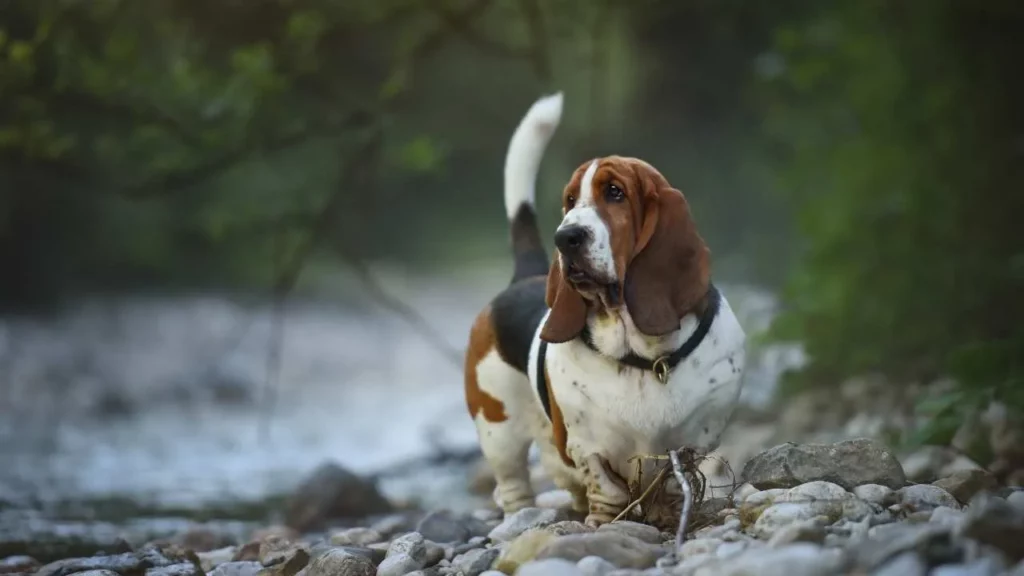
Bloodhound
Bloodhounds also have short, low-maintenance coats, but their deeply wrinkled faces and long, floppy ears need routine cleaning to keep infections at bay. Dirt, moisture, and bacteria easily collect in their skin folds and ears, making regular grooming sessions essential. Like Basset Hounds, Bloodhounds shed moderately and aren’t suitable for those with dog allergies.
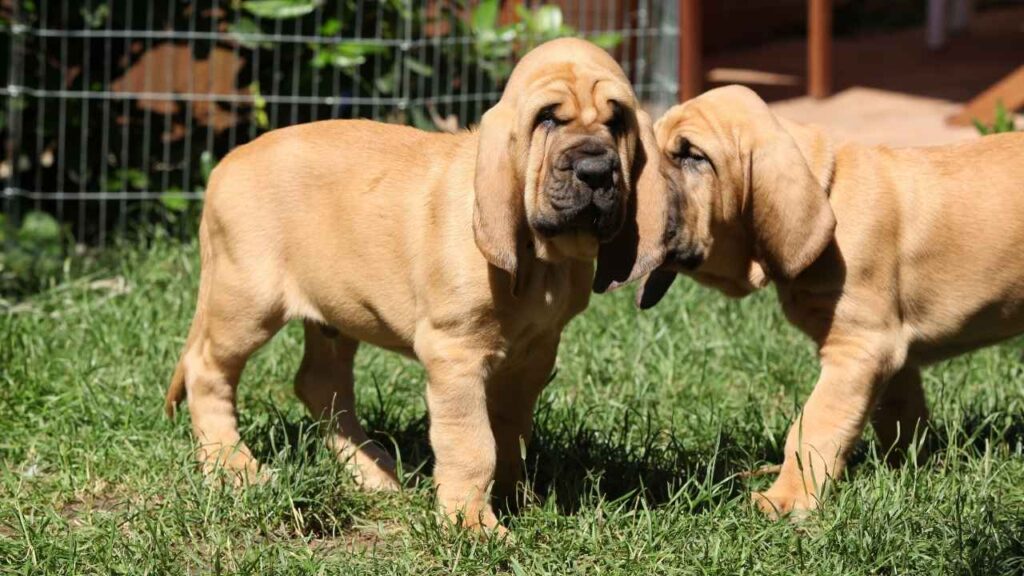
Key takeaway: Both breeds are relatively easy to groom, but special attention is required for their ears and skin folds. Neither breed is hypoallergenic, so allergy-prone individuals should consider other options.
Conclusion
When choosing between the Basset Hound and the Bloodhound breed, your decision should reflect your lifestyle and expectations. If you’re seeking a calm, affectionate family companion with lovable floppy ears, the Basset Hound is an excellent choice. Originally bred as hunting dogs, Basset Hounds have become popular for their laid-back, easy-going nature, making them one of the best dog breeds for relaxed family living.
Alternatively, if you’re drawn to a dog with incredible tracking skills and unmatched scenting abilities, the Bloodhound breed, also known as the Hubert Hound, could be your ideal partner. Naturally skilled as scent hounds, Bloodhounds have long excelled at tracking scents and are widely regarded as one of the top breeds for search-and-rescue missions. Renowned for their intelligence, determination, and remarkable noses, these hunting dogs possess both charm and skill.
The American Kennel Club recognizes both the basset hound and bloodhound breeds as purebred dogs, each offering unique and distinctive qualities.


